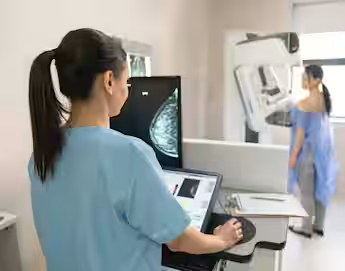AI breast screening technology developed by academics and expert healthcare professionals has the potential to help practitioners detect abnormalities that may be missed using the current breast cancer screening procedures.
Currently, mammograms – low-level X-rays used to detect and monitor signs of breast cancer - save around 1,300 lives each year in the UK. Unfortunately, plenty of cases are missed, only picked up at a later stage when the cancer has progressed and become more noticeable. The World Health Organisation found that in 2020, there were 2.3m breast cancer diagnoses and 685,000 deaths from the disease.
The AI research is pioneered by the University of Aberdeen, NHS Grampian, and Kheiron Medical Technologies, which analysed 220,000 mammograms from more than 55,000 people to determine how well the AI tool detects breast cancer.
The software, named ‘Mia’, was assessed by a research team from the University of Aberdeen. Their analysis found that the technology was successful in identifying potentially missed cancers, known as interval cancers.
They found that Mia would have suggested recalling 34.1 per cent of women who would go on to develop cancer in between screenings.
The New York Times reports that the AI technology being tested has demonstrated an impressive ability to spot cancer at least as well as human radiologists, according to early results and radiologists, in what they believe is one of the tangible signs to date of how AI can improve public health.
While there are fears that using AI technology in healthcare could eventually eclipse the role of a skilled radiologist, its potential to speed up the process of drug and disease discovery means many scientists and doctors see AI as a powerful tool to work with, rather than replace, skilled practitioners.
With the current issue, the NHS is facing a 30 per cent shortfall in clinical radiologists, which in turn is leading to longer waiting times and worse health outcomes, according to the Royal College of Radiologists. Given the chronic staff shortages within our NHS currently, this AI technology could play an essential role particularly with regards to the future of breast screening. AI certainly has massive potential to help reduce cases of delays in diagnosing and treating breast cancer.
Read about our delayed cancer diagnosis claims and case studies from our award-winning team of medical negligence solicitors in Manchester:
- Jenny Urwin recently won a £1m settlement for delayed lung cancer diagnosis at Manchester Royal Infirmary
- Claire Horton secured a 95% admission of liability for a young woman left blind following delayed diagnosis of optic nerve glioma and anticipates a seven damages figure settlement
- Lindsay Holt secured a substantial six-figure settlement against two GPs at an NHS practice in Harrogate who failed to take steps to diagnose her client's bowel cancer despite his symptoms falling within NICE guidelines for referral
- Julia Hamilton concluded a case on behalf of a family of an elderly woman who died from metastatic melanoma after a negligent delay in diagnosis at United Lincolnshire Hospitals NHS Trust

